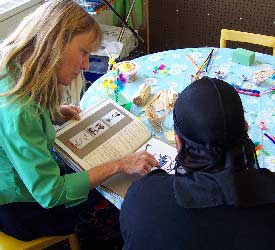Art Therapist
Tasks & duties

Art therapists may do some or all of the following:
-
help clients identify their concerns and goals
-
determine the best methods, processes and art materials for working with the client
-
help clients express their thoughts and feelings in a safe therapeutic environment
-
facilitate clients' use of painting, drawing, modelling or other artistic media to restore their well-being and support developmental needs
-
develop and review specific treatment plans
-
consult with other therapists to develop treatment approaches
-
assess clients and write reports about them
Skills & knowledge
Art therapists need to have:
-
ability to use a variety of art materials and knowledge of different art techniques
-
knowledge of counselling and therapy theories and techniques
-
skill in the application of assessment and treatment methods
-
knowledge of up-to-date research in their area of work
-
knowledge of human development, and how the human mind and body work
-
good communication and listening skills
-
observational skills
-
ability to deal with a wide range of people
-
analysing and diagnosing skills
-
an understanding of the creative process
Entry requirements
To become a registered art therapist you need to have a tertiary qualification in a field such as, teaching, nursing, psychology, fine arts or art education, and a postgraduate diploma or masters degree in art therapy.
Secondary education
A tertiary entrance qualification is required to enter tertiary training. Useful subjects include art and biology.
Training on the job
Skills can be developed on the job with supervision by a qualified therapist. Art therapists may also gain further skills through workshops and conferences. They may choose to complete further study overseas.
Registration
Art therapists are encouraged to register with the New Zealand Association of Counsellors or the New Zealand Association of Psychotherapists. However, plans are underway for the Australia and New Zealand Art Therapy Association to provide membership and registration to qualified art therapists. Art therapists who have trained outside New Zealand may be registered with an equivalent association overseas.
Useful experience
Useful experience for art therapists includes:
-
work in health or education such as teaching, nursing or counselling
-
work in social services
-
work as a teacher, nurse or counsellor
-
experience working with a variety of therapy methods and practices
-
participation in therapeutic programmes
-
experience working with different art materials
Related courses
Rehabilitation Therapies
Support for the Older Person
For more information, please refer to Career Services.
Document Actions
